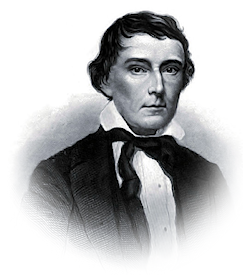Crawfordville [Ga.], May 8th, 1860.
Dear Smith, I got the book I requested you to buy for me, but no letter came with it. I am obliged to you for your attention to this matter. The book is different from what I expected to find it. I did not get back from Polk Court until last Friday. On the way down the road I met the news of the “blow up” or “break down” of the Charleston convention. At this I was not much surprised, but for it I was truly sorry. I deeply regretted the withdrawal of the Southern delegations, especially that of Georgia, and particularly for the reason assigned—that is, the unsoundness of the platform adopted. It is the same as the campaign was waged on in 1856 with the addition, I understand, of what the Georgia state convention requested. But as for myself I was satisfied with the Cincinnati enumeration of principles and I think it was all [that] ought to be asked. Since 1850 I have stood upon non-intervention by Congress on the subject of slavery in the territories. I and all parties at the South at least have been pledged as far as honor can pledge any man to abide by the territorial policy established in 1850 “in principle and in substance.” These words were put in the Whig Baltimore platform in 1852 by Mr. Webster at my own instance, and I drew up the Southern manifesto against General Scott because he would not endorse it. That paper is now in my possession; and I shall never change my views or position then taken, so long as ink will not blush at human inconsistency. What is to become of parties in the country I do not know but of my own honor I know what shall come. That is in my own keeping, and if I and the country go down together that shall remain untarnished to the last. Parties may rise or fall, but principles with me are the pole star of my existence. What is the matter now with the country is that a class of men are in power who have no loyalty to principle, no attachment to truth for truth’s sake. They are governed by a desire for office, for place and spoils, and change principles with any change of popular [breeze?] in their eagerness to get it. They [are] out for nothing but to undermine the most glorious structure of human Gov[ernme]nt ever devised by man. It may be that the people too are degenerate. If so we are in a bad fix indeed. But I do not believe they are half so far gone as their leaders. I believe they have virtue enough yet left to see truth when it is presented and act upon it. I cannot believe that this country is so near the brink of ruin and destruction as the times to a casual observer indicate— a greater, a higher and a nobler destiny awaits. Bad men have got control of the country. The temple must and will be ridden of the money changers who have defiled the most sacred places. This at least is my hope. If in it I shall be disappointed then all hope will go out together—all hope with me, for I have none beyond. If we are to go into a Revolution with men and under the lead of men who have changed their whole line of public policy in ten years, who could trust them for three under a new regime? What trust could be put in their counsels? What reliance in their judgments? What confidence in their professed principles? None by me—and Heaven protect those who may be simple minded enough and weak enough to try them!
From Annual Report of the American Historical Association for the Year 1911.
Alexander Hamilton Stephens was an American politician who served as the vice president of the Confederate States from 1861 to 1865. After serving in both houses of the Georgia General Assembly, he won election to Congress, taking his seat in 1843. After the Civil War, he returned to Congress in 1873, serving to 1882 when he was elected as the 50th Governor of Georgia, serving there from late 1882 until his death in 1883.
J. Henley Smith was a Georgia journalist.
